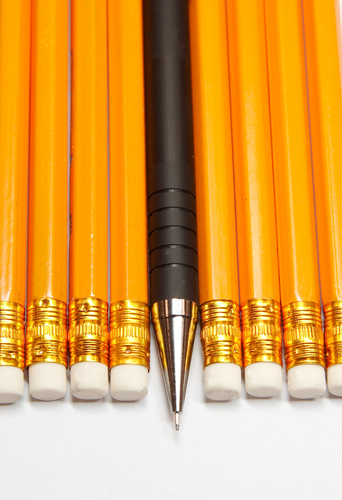Why can’t you bring mechanical pencils to the LSAT? Blame test-taking tricksters

Photo by Sergey Plakhotin/Shutterstock.com.
Attorney licensing exams are not immune from cheating, says James Wollack, an educational psychology professor at the University of Wisconsin at Madison whose research includes test security. In fact, the first time he was asked to analyze exam result data to see whether it supported test fraud, it was for a Multistate Professional Responsibility Examination.
“When I tell people I do research on cheating, I very commonly hear feedback along the lines of ‘Is cheating really the problem you are making it out to be,’ ” Wollack said Friday at a New Mexico conference on high-stakes testing, co-sponsored by the Law School Admission Council and the National Conference of Bar Examiners.
Cheating on admissions and license exams, Wollack said, is indeed a problem, but most testing groups don’t use the term cheating. Instead, he tells the ABA Journal, they prefer “irregularity,” in reference to answers and scores. Cheating is an emotionally charged term; there’s no legal definition on what constitutes cheating and when that sort of conduct arises, proving that intent is difficult if not impossible, according to Wollack.
Mark Albanese, the National Conference of Bar Examiner’s director of testing and research, said at the conference that for the July 2018 bar exam, his organization was asked by six jurisdictions to investigate test irregularities, for 30 individuals.
The NCBE does not release information about which jurisdictions request assistance for bar exam irregularities, Kellie Early, the organization’s chief strategy officer, tells the Journal. Statistical analysis can be done for the multistate bar exam portion of the test but not the essay and performance components.
In terms of how people cheat on the tests, cellphones are “the biggest threat out there,” for test security, Wollack says. Exam takers usually place their cellphones in lockers at testing centers, but people may come to the facility with more than one phone and bury them in clothing. Or they might hide their phones somewhere in a building’s bathroom.
Wearable technology is also issue. Smartwatches are banned from testing centers, but there are smartwatches that look like analog watches and “smartrings,” which work like smartwatches, Wollack told the audience. He also mentioned Bluetooth earpieces that present as large earrings. On the low-tech side, most testing centers ban hoodies because answers can be hidden in the hoods.
Another concern are tiny devices that can hide cameras, including eyeglasses, for people who want to take pictures of test questions and sell them. Hollow items, such as mechanical pencils, which are banned from LSAT testing centers, also are suspicious, says Faisel Alam, who manages the LSAC’s office of test security. Besides cameras, the barrel of a mechanical pencil could hide rolled up pieces of paper with test content, according to Alam.
Kellye Testy, CEO and president of the LSAC, estimates that the majority of problems that the organization encounters are related to people who want to sell LSAT questions rather than people looking for better scores.
“It really adds to the expense of the test if people steal questions because you have to throw them out and start all over,” she tells the Journal.
Starting in July, the organization will be offering the exam digitally, and Testy says the organization took its time on that decision because of internet security concerns. What it came up with includes patented software that includes a security component.
The LSAC estimates that the number of irregularities or violations on LSAT tests is on average less than 1 percent annually. As with most admissions and license tests, red flags include irregular patterns on exams, such as when multiple test takers get the same questions wrong. If two test takers have completely different forms but their test has the exact same answer pattern, that would warrant an investigation, Alam says, as does an “unusually large score gain.”
If someone is accused of misconduct on the LSAT, they have the right to a telephonic hearing and an administrative appeal. Some accused of misconduct opt for a refund of their testing fee and a security cancellation on their score report, but most choose to take a private retest to confirm the score, according to Alam. Also, for most situations, the test taker is free to register and sit for the LSAT again.
Creating an exam environment that is secure and comfortable requires communication between test administrators, test takers and the LSAC, according to Alam. Testy plans to make a recorded statement explaining the security process, which test takers will hear shortly before the exam begins.
“I’ll say ‘I know you probably thought security was difficult, but it’s for your protection. We believe in you, and we’re glad you are here,’ ” she tells the Journal.
Correction
Updated on March 4 to correct the spelling of James Wollack’s name.
Write a letter to the editor, share a story tip or update, or report an error.


